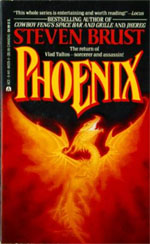 One of the things that tends to happen with long series of speculative fiction novels is that, at some point, the author will stop, look around, and begin thinking about how the world around their main character really works. They’ll begin asking questions like:
One of the things that tends to happen with long series of speculative fiction novels is that, at some point, the author will stop, look around, and begin thinking about how the world around their main character really works. They’ll begin asking questions like:
What is it really like to live as a near-immortal in this semi-feudal, caste-based, Fate-bound Empire I’ve created? How long does a near-immortal remain a child or a young adult? What types of jobs do the common people do? How does the economy function?
And so forth.
This can either be a good thing or it can be a bad thing. It’s a good thing if it adds a richer depth to the world and opens up stories which might otherwise never be told. It’s a bad thing if it leads to the author blandly info-dumping their “research” (which, in this case, doesn’t even have the advantage of imparting actual facts).
In the case of Brust’s Dragaera novels it is a very good thing.
As with my discussion of non-traditional narrative structures in Taltos, this is another trend that actually started with Teckla, but it’s a tradition that carries strongly into Phoenix.
Brust doesn’t make the mistake of boring his readers by having his protagonist (Vlad) lecture them on the finer details of Imperial history, military tactics, or social engineering. Instead, the world simply happens. Details are dropped when necessary for comprehension, but the focus remains tightly fixed on the immediate story being told.
In the case of Phoenix, it’s a story made up of political assassinations; divine meddling; foreign entanglements; social unrest; and (most importantly) personal crises.
I think it says something about this novel that, by page 5, Vlad is standing in front of a goddess… and proceeds to haggle with her.
Let me say that again: Vlad stands in a front of a goddess and haggles with her.
I’m not sure what it says to you, but to me it said: “WARNING: AWESOME ROLLERCOASTER RIDE COMING UP.”
The other thing to note here is that what really makes these Vlad Taltos novels click is not what happens (although that’s almost always entertaining in its own right), but how those events affect the characters.
The only real criticism I can level at Phoenix is that it never quite comes into its own — it never quite seems to figure out how to fire on all cylinders. The events of the novel are all entertaining enough, but don’t quite rise to a particularly memorable level in their own right. The supporting cast is still varied and well-drawn, but none of them are deeply affected by the events of the novel. (Which should not be thought a flaw: There is no particular reason why they should be affected or transformed by these events.)
Which means that the real engine of the novel is, essentially, the character arc of Vlad Taltos himself. But even here, the developments of Phoenix are essentially a coda to the turning point reached during Teckla. In many ways, in fact, Phoenix ends up feeling like an extended (although not over-extended) epilogue to that novel.
Which is fine. It’s probably even a necessary step in the development of Vlad’s character. But it does mean that Phoenix is (a) the first novel in the series that doesn’t stand by itself; and (b) pleasant enough, but nothing to get particularly excited about.
Actually, maybe “epilogue” isn’t quite the right description. In a lot of ways, this book feels like the second part of the trilogy — having neither the advantage of an explosive beginning (Teckla) nor the satisfaction of a well-earned conclusion (wherever Vlad’s going).
One final note: I was utterly unsurprised when I reached the end of the novel, read Brust’s biographical blurb, and discovered that he had joined a band. I’m not sure what it is about SF authors who join bands, but they seem incapable of realizing that what they think are “pithy” observations about how “crazy” the music biz is are (a) not that interesting and (b) usually bone-jarringly anachronistic.
It kinda reminds me of certain military SF written by actual combat veterans in which the tactics, jargon, and culture of 33rd century warfare all look and sound exactly like whatever war the author was fighting in (even when that doesn’t make the slightest lick of sense).
I think it must have something to do with the experience being personally transforming, while also being so incredibly personal and specific that they have difficulty using the material to enrich their writing instead of letting the material use them. (For a counter-example, consider J.R.R. Tolkien’s personal experiences in World War I. The battles described in The Lord of the Rings don’t look anything like trench warfare (and would be horribly anachronistic if they did). But I feel that Tolkien was still able to use his personal experiences to enrich his fictional depictions of what being in a war feels like.)
GRADE: B-
Steven Brust
Published: 1990
Publisher: Ace
Price: $7.99
ISBN: 0441662250
Buy Now!











